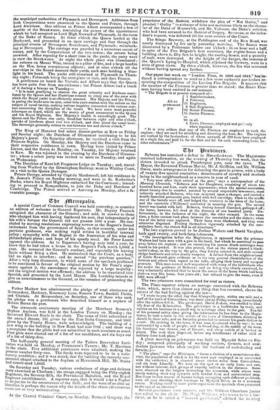'Ube Iiiittropolis.
A special Court of Common Council was held yesterday, to consider an address of welcome to General Espartero. Mr, Deputy Peacock eulogized the character of the General ; and said, in answer to those who charged him with having feathered his nest, that independently of his wife's fortune the General did not possess 500/ a year. He con- cluded by moving resolutions expressing sorrow at the Regent's forced retirement from the government of Spain, as that country, under his patriotic guidance, was making rapid strides in healthful internal policy; sympathy with the Regent in the frustration of his wise and philanthropic plans ; and hope of his speedy recaL Sir Peter Laurie opposed the address. As to Espartero's having only 500/. a year, he knew that he had taken a house in the Regent's Park worth 1,000/. a year. He censured the General's conduct,, and especially his leaving Spain without firing a shot. He maintained that the Court, as a body had no right to interfere; and he moved "the previous question.' After a very long discussion, in which some of the speakers professed to be convinced in favour of the original motion by Sir Peter's argu- ments against it, the amendment was rejected by a large majority ; and the original motion was affirmed ; the address to be translated into Spanish, and presented by the Lord Mayor. His Lordship intends to give an entertainment to the General, as the occasion of presenting the address.
Father Mathew has administered the pledge of total abstinence at Bermondsey, Hackney, Rosemary Lane, Somers Town, Buohill Fields, and Chelsea. At Bermondsey, on Saturday, one of those who took the pledge was a gentleman who described himself as a nephew of Robert Burns the poet.
The sixteenth anniversary meeting of the Merchant Seamen's Orphan Asylum, was held at the London Tavern on Monday ; the Reverend Edward Boyle in the chair. The sums of 5311, subscribed at the annual dinner, 501. given by the East India Company, and 100/. given by the Trinity House, were acknowledged. The building of a new wing to the building in Bow Road had cost 700/. ; and there was a complaint that the pilots had not subscribed in such numbers as usual. Four girls were elected out of a list of ten candidates, and six boys out of a list of thirty-five.
The half-yearly general meeting of the Tailors Benevolent Insti- tution was held on Monday, at Freemason's Tavern ; Mr. T. Harrison in the chair. Five additional pensioners were admitted, making the present number forty-one. The funds were reported to be in a satis- factory condition ; and it was stated, that for building the recently-con- secrated chapel attached to the Asylum at Haverstock Hill, Mr. Stultz had contributed 1,666/.
On Saturday and Tuesday' various evolutions of siege and defence were exercised at Chatham ; the troops engaged being the Fifty-eighth Regiment, the Seventy-fifth, the Provisional Battalion, and the Royal Engineer establishment. A. reporter says, that it would take a Napier to do justice to the occurrences of the field ; and the want of so able an historian is perhaps the reason why the details of the sham-adventurous scene are so very uninteresting.
At the Central Criminal Court, on Monday, Barnard Gregory, the ) proprietor of the Satirist, withdrew the plea of "Not Guilty," and pleaded " Guilty " to a charge of false and malicious libels on the charac- ter of the Duke of Brunswick, and Mr. Valiance, the Duke's solicitor, who had been accused iu the Satirist of forgery. Sentence, at the defen- dant's request, was deferred till the next session of the Court.
The Stingo Brewery, at the Paddington end of the New Road, was nearly destroyed by fire early yesterday morning. The flames were discovered by a Policeman before one o'clock ; in an hour and a half, in spite of the Fire Brigade's best exertions, the engine-house and a building above it, fifty feet in height, the cooling-house, and a quantity of malt, were destroyed. At the height of the danger, the inmates of the Queen's Lying-in-Hospital, which adjoined the brewery, were in a state of great alarm. By three o'clock, however, the fire was mastered without having spread any further.
Our paper last week on "London Fires, in 1666 and 1849," has:ise duced a correspondent to send us a few more authentic particulars re- specting the composition of the London Fire Brigade. It appears that the number of the Freemen is greater than we stated ; the Senior Fire- men having been omitted in our account.
"The Brigade is at present composed of-
1 Superintendent, 4 Foremen, All on 11 Engineers, permanent 8 Sub-Engineers,
pay' 32 Senior Firemen,
34 Junior Firemen.
90 in all.
4 Extra Firemen, employed and psi I only when required. "it is very seldom that any of the Firemen are employed to work the engines : they are used for attaching and directing the hose, &c. The engines are worked by the bystanders; of whom upwards of 500 have been employed at a single fire, and paid Is. for the first and 6d. for each succeeding hour, be- sides refreshments."


























 Previous page
Previous page